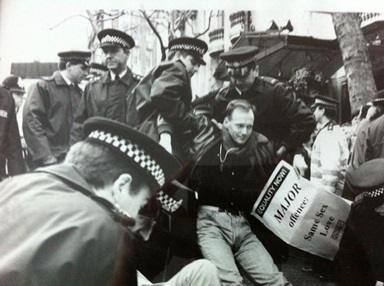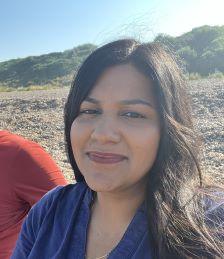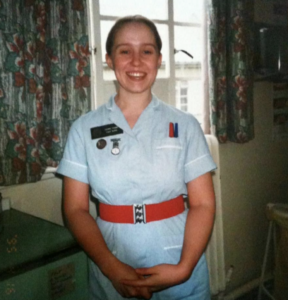The NHS employs staff from all over the world and 350 different careers. As well as this, volunteers of all ages and backgrounds make a huge and often unseen contribution to the NHS. We want to showcase our colleagues who make the NHS what it is. Below are staff stories from some of our NCL ICB colleagues.
Phil Wrigley, Head of Primary Care Planning and Operations, shares his experiences of LGBT+ activism in the 1990s, and the evolution of Pride throughout the years.
 Tell us about your role
Tell us about your role
I’m Phil Wrigley – Head of Primary Care Planning and Operations. I work in PC mainly focusing on the operational side of service delivery. Working closely with GP practices, Primary Care Networks (PCN) and Federations to deliver locally commissioned services, federation contract management, delivery of the national PCN Enhanced Service.
It’s got a strong relational element – ensuring that we remain close to our providers, develop trust and engage them in the longer term future of primary care.
You shared an impactful photo with us. What does it show and what led to you being there?
The picture was taken in the early 1990s when I was a member of a gay activist group called OutRage!. OutRage! was set up to challenge homophobia through non-violent activism. We were closely aligned to ACT-UP which was an HIV/AIDS activist group and we often did joint protests.
This particular protest was a sit-in outside the Wyndhams Theatre on Charing Cross Road. Protests at the time were not allowed within a certain distance of the Houses of Parliament and we deliberately crossed that line, sat on the ground and blocked the traffic.
I was involved in countless other protests but this photo was taken by a Guardian journalist, and it ended up on their front page. I spent the afternoon in a cell in Camden police station where I noticed that the duty desk officer seemed to have a somewhat overly keen interest in getting an autograph from Jimmy Summerville (who had also been on the protest).
What would you like people to know about LGBT+ activism?
It’s hard now to describe to younger people what society was like in the 80s and 90s; or rather it is hard for them to understand how it felt. Margaret Thatcher had implemented Section 28 which forbade local councils from “promoting homosexuality” in schools, resulting in greater levels of bullying and huge anxiety amongst the teaching profession (a reason for protest).
There was openly hostile coverage from all elements of the media (a reason for protest). Gay bashing was a common occurrence and increasing (a reason for protest). Churches often refused admittance to “openly” gay people and the pope had formally condemned homosexuality (a reason for protest).
There were no partnership rights so the partners of people dying from AIDS frequently lost the homes where they had lived for decades or were not even allowed to attend funerals (a reason for protest). Almost everything at the time gave rise to outrage.
It was a time of persecution but also a time of coming together. There was a real feeling of a gay culture and community due to the fact that we were having to fight for whatever rights we could get.
What does Pride mean to you?
Not a lot any more I am afraid. It has become a carnival and has lost the political purpose that it used to have. It used to be completely open so you could join the parade at any point and walk with the marchers – you could walk with the leather queens from Earls Court (banners challenging legality around BDSM) and then move on to join the Dykes on Bikes (banners against anti-lesbian homophobia) or the people with HIV walking valiantly with the help of sticks or pushed in wheelchairs desperate to go to their last march (they needed no banners).
Now Pride is barriered and people are there just to watch the floats and all the many groups of dancing queens. It’s great “fun” and we should rejoice that it is able to take place, however it reminds me too much of people at a zoo watching exotic birds and animals.
In this current world climate we have to remember that the rights that we have gained after years and years of struggle can be taken away in a heartbeat.
We must never allow ourselves to get complacent or dance ourselves into oblivion.
Find out more
- Stonewall – information, support and guidance on LGBT+ inclusion
- OutRage! photo archive
- Pride in London – information on the annual event
Karina Sale, Engagement Manager – Me, RSV and other pregnancy vaccinations
 Tell us about your role
Tell us about your role
I’m Karina Sale, Engagement Manager in the Communications and Engagement Team at North Central London Integrated Care Board. I absolutely love my job, but I’m currently preparing for a new, very different project – having my second baby!
The past few weeks have been a whirlwind of writing handovers, finalising engagement plans, planning the recruitment of my maternity cover and briefing colleagues on our major primary care campaign, Your Local Health Team, on ways to engage with local communities across North Central London.
How have you been getting ready for your new baby?
During all of this, I’ve also had a parallel schedule of scans and prenatal appointments with my midwife and arranged my pregnancy vaccinations.
I booked my flu and COVID-19 vaccinations, same as I have done for the last few years. This year though, I did a bit of extra reading about vaccines in pregnancy, just to reassure myself I was making the right decision for me and my baby.
As part of this, I read up on the respiratory syncytial virus (RSV) vaccine, being offered for the first time from autumn 2024 to people aged 75-79, as well as to anyone expecting a baby, from 28 weeks of pregnancy up to giving birth.
What made you decide to take the RSV vaccine while pregnant?
I decided to take up this offer to protect my unborn baby from lung infections like bronchiolitis, that can make infants very ill if caught in the first six months of their life.
My first born was quite ill with bronchiolitis, which involved a visit to hospital, so I’m hopeful the RSV vaccine will prevent that from happening again this time around.
How do you feel about this?
After having the vaccine at 35 weeks pregnant, I now have some peace of mind.
I know when my baby is born their vaccination journey will begin, with jabs due at eight weeks, 12 weeks and 16 weeks. I’ll be sure to put them all in the diary and carry on up to three years and four months, when the last of the routine childhood vaccinations are due.
In this short video, I talk about why I got the RSV vaccine: youtube.com/shorts/JlzZZQawry8
What else should people know about RSV?
RSV can cause lung infections like bronchiolitis, making it difficult for newborn babies to breathe.
It is recommended to have the RSV vaccine if you are pregnant, from 28 weeks onwards, to protect your baby. It is suggested to have it once in each pregnancy.
The RSV vaccine is also recommended if you’re aged 75 or over. It is just taken once (not every year like the flu vaccine).
- Find out more at RSV vaccine – NHS (www.nhs.uk)
- See our Vaccinations in pregnancy leaflet (nclhealthandcare.org.uk)
- Visit Get protected, get vaccinated – (nclhealthandcare.org.uk)
Angela O’Shea – NCL ICB Harm Free Care Lead and Joint Vice-Chair of the NCL ICB BAME Staff Network

When did you start in the NHS?
I started in the NHS in January 1991 when I commenced my student nurse training.
Why did you choose to work in the NHS?
My mother trained as a nurse and I come from a large family (I have five siblings!) I have always cared for people throughout my life, so it felt like a natural progression for me to enter the nursing profession.
Describe what you do in 100 words.
I am the Harm Free Care Lead for NCL ICB, support the Health Inequalities, Inclusion Health agenda and I’m also Joint Vice-Chair of the BAME Staff Network where I have established the Diversity and Inclusion Book, Film and Music Club and other equality, diversity and inclusion activities – Black History 365 events etc
What do you enjoy most about your role?
Throughout my NHS career I feel proud that I have been able to make a difference and help improve the quality of patient care both as a nurse and in my current role. I particularly enjoy contributing to the current equality, diversity and inclusion activities (EDI) and have received feedback on the fantastic work that has been achieved regarding the Diversity and Inclusion Book, Film and Music Club where discussions about EDI can be held in a safe space. All other staff networks have been involved to cover protected groups and intersectionality.
How would you describe the NHS in one word?
Fantastic.
Dr Jo Sauvage, NCL ICB Chief Medical Officer

When did you start in the NHS?
Started working in the NHS in 1988 on my pre-registration house job. However, I worked as a student in the hospitals and GP surgeries of NCL since 1985.
Why did you choose to work in the NHS?
I chose to work in the NHS as I really wanted to be a Dr from my teenage years. My primary carer died when I was very young and in a strange way, I wanted to vanquish illness. From my O level in history, I also realise I was most passionate about social reform and this has been important in my journey as an advocate for social justice. This is recognised once again as important, just as it was 75 years ago when the NHS was established.
Describe what you do in 100 words.
I am ‘a local girl’; I went to school in Highgate, trained at UCLH, worked in most of the Trusts in North Central London and been a school Dr in Islington during the 1990’s, visiting all the schools. I am now a GP by trade and have worked in Old Street since 1999, watching it become the trendy place it is now. I am very proud to be the Chief Medical Officer in an area of London, I am strongly connected to. I love what I do and I love to be connected to the people of North Central London.
What do you enjoy most about your role?
I enjoy working in a place I feel part of. I am fortunate to be surrounded by colleagues committed to doing their best for residents and are passionate about the importance of the National Health Service. I enjoy the kinship of working with people who want to contribute to society through what they do, daily. I enjoy the purpose, the challenges, the finding of solutions, the daily giving through compassionate conversations, the ‘being there’ for people who feel disenfranchised and lonely. This has been a large part of my life; in this place, doing this job. I have tried to add value up until now and there is always more to do.
How would you describe the NHS in one word?
Precious
Stacey Kennedy – NCL ICB Head of Transformation & Efficiency – Complex Individualised Commissioning and Chair of the NCL ICB BAME Staff Network

When did you start in the NHS?
I started in the NHS in September 2003 where I supported the Director of Estates and Facilities for Ealing PCT.
Why did you choose to work in the NHS?
I like to say that the NHS choose me. I was directing my studies to a career in marketing and public relations – and worked in that field for a bit – but then the opportunity came in the NHS and, since then, I have never left health.
Describe what you do in 100 words.
I am the Head of Transformation and Efficiency for Continuing Healthcare and Complex Individualised Care (CYP/MH/LD) where I plan, monitor and report the delivery of our programme – namely Cost Improvement Programme and Transformation. I also focus on supporting project managers develop and deliver viable outcomes which benefits our service-users, organisation and system.
I am also the Chair of our NCL ICB BAME Staff Network with a membership of 40. Our aim is to create an inclusive culture in NCL ICB where staff from BAME backgrounds feel supported, valued, respected and listened to with no fear of discrimination or prejudice and a belief that career opportunities or experience of work are not predetermined by ethnicity, nationality or colour.
What do you enjoy most about your role?
Delivering a programme is ever changing and there is variety in my role with continuous learning. My colleagues, who I have created a strong bond with, are always there to provide their expertise in delivering initiatives that truly make a difference to our most vulnerable population. I feel proud to be a part of this.
Our BAME Staff Network has grown and the camaraderie and support we have built is invaluable – including having a secure Safe Space. Under the Equality, Diversity and Inclusion Agenda we work together with our other Staff Networks, and we ensure that our activities creates awareness of our protected groups and intersectionality.
How would you describe the NHS in one word?
Dynamic.
Yvonne Conway – NCL ICB Designated Nurse for Looked After Children (Barnet and Islington)

When did you start in the NHS?
I started in the NHS 1991 as a student nurse at Barnet School of Nursing. I was the first of a new cohort of students completing a new programme of nurse training called Project 2000. We studied Middlesex University and later at Hertfordshire University. My practice was at Barnet general Hospital, Edgware General Hospital, The Royal National Orthopaedic Hospital and in the Barnet Community services and Voluntary services across Barnet and north London.
Why did you choose to work in the NHS?
I fell into it really. I went to college to complete my A Levels and a prevocational course for those wanting to go into nursing, social care and teaching. My chosen path was education, but I lost my motivation at that stage and did not meet the levels required for the university course I had chosen. Friends were going into nursing, so I applied. It enabled me to study my A Level subjects again but at Diploma level and pass with great grades. I fell in love with my community nursing placements and found a whole new career path, which has enabled me to still fulfil original wish to educate too.
Describe what you do in 100 words
I have the privilege to support and advocate for the most vulnerable group in our society; Looked after children and care experienced (LAC CE). I utilise my years of knowledge and experience as a LAC nurse to highlight and bring awareness of the inequalities they face and tackle these both at borough and system level, ensuring quality and safeguarding. My ambition is to take the LAC principle of ‘good enough for my child’ to the next level, by supporting LAC and CE (NCL & nationally) to be protected characteristics and for Corporate Parenting to be lifelong support of our CE.
What do you enjoy most about your role?
Working with multi agency colleagues who also have a passion for this group of children and young people. My role through partnership work with Corporate Parenting Boards enables me to maintain a strong level of connection to looked after children and care experienced to ensure I am advocating the right messages.
How would you describe the NHS in one word?
Hope
